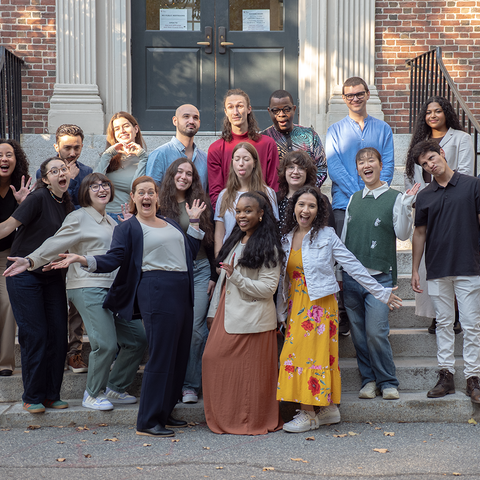Lessons in Forgiveness and Flourishing
Professor Tyler VanderWeele, PhD ’06 on a practice that’s good for the spirit—and the mind

"Hatred does not cease by hatred, but only by love; this is the eternal rule," reads the quote from the Dhammapada, a collection of the Buddha's teachings in verse form. Whether eastern or western, spiritual traditions around the world include forgiveness as a part of their ethical frameworks. It’s one of the earliest lessons we learn as children: to treat others the way we want to be treated, to forgive when we’ve been harmed, and to seek forgiveness—and make restitution—when we’ve done harm to others.
According to Tyler VanderWeele, PhD ’06, John L. Loeb and Frances Lehman Loeb Professor of Epidemiology in the Departments of Epidemiology and Biostatistics at the Harvard T.H. Chan School of Public Health, forgiveness is more than spiritual practice or even good behavior—it’s good mental health. As director of the Human Flourishing Program and co-director of the Initiative on Health, Spirituality, and Religion at Harvard, he researches the impact of the practice on wellness and finds surprising benefits to learning how to forgive.
A Different Response to Harm
VanderWeele says that many common responses to being hurt or wronged are actually counterproductive for our wellbeing. One is rumination—repeatedly thinking about the offense—which may lead to anger or a desire for revenge. “Vengeance might sometimes help us feel better momentarily, but often the injury within us remains.”
Another is to try to suppress the hurt or wrongdoing, to set it aside or pretend it didn’t happen. This is the way that many of us think of forgiveness. “It’s easy to see why that would be a natural response, but those wounds may come back again and again and lead to anxiety,” he says. Both ways of responding to injury can trap us in negative feelings and prevent us from moving past the offense.
VanderWeele offers a slightly different take on forgiveness—one that leaves room for a greater variety of human experience: replacing ill will towards an offender with goodwill. It’s not about excusing or condoning the harm or reconciling with the offender; it’s about hoping for the ultimate good of the offender and empathizing with their humanity, even as we pursue a just outcome. This forgiveness leaves room for our pain but gives us a different way to respond to it.
Using VanderWeele’s definition, forgiveness actually frees the victim from the offender. Instead of remaining tied to the offense, it begins to lose its grip over time. The victim can say, “This person may have done wrong, but they are still a person. I want what is good for them, which may include reform or correction, without condoning what they did.” Orienting oneself towards respect for others and towards goodwill can be a powerful experience with measurable impact on mental health and self-esteem. VanderWeele cites studies that show, for instance, that forgiveness helps reduce depression and anxiety, and increases hope, both in the short and long term.
Putting Forgiveness in REACH
Of course, understanding this concept of forgiveness is one thing; putting it into practice is another. Similar to the way it is often easier to give advice than to take it, we may be able to recognize how important forgiveness is but feel it’s impossible—or even dangerous—to do, particularly when the wounds are deep. Thankfully, Professor VanderWeele recommends some tools that can put forgiveness in reach—literally.
Developed by Professor Everett Worthington of Virginia Commonwealth University, the REACH model breaks forgiveness into steps that make the process more accessible and maximizes the benefits to our wellbeing. These are:
- Recall: Recall the hurt.
- Empathize: Empathize with the offender—without excusing the action or invalidating your own feelings.
- Altruistic gift: Give the altruistic gift of forgiveness.
- Commit: Commit to forgiving.
- Hold: Hold onto forgiveness.
In collaboration with Worthington, VanderWeele took this framework a step further and developed the self-directed handbook “Your Path to REACH Forgiveness: Become a More Forgiving Person in Less Than Two Hours.” Less time than it takes to watch even a single Lord of the Rings film? Sounds like a tall order. But after multiple randomized trials involving 4500 individuals from 5 countries with high levels of conflict (Columbia, South Africa, Ukraine, Indonesia, and Hong Kong), participants consistently reported lower depression and higher levels flourishing after using the handbook—notable effects considering the short length of time.
Make Time for Spiritual Wellness
What else can we do if we’re feeling spiritually disconnected and are not ready to forgive? VanderWeele recommends other exercises for spiritual wellbeing, including:
- tuning into your thoughts and body through mindfulness or meditation
- writing three times per week what you are grateful for and why
- performing at least five acts of kindness in a single day that you normally would not do
- engaging in “best possible self” exercises to imagine the best possible version of yourself ten years in the future—and the practical steps that can get you there.
Last but certainly not least, check out the Human Flourishing Program, which includes evidence-based guides to some of the wellbeing practices mentioned. And if you want to learn more about forgiveness, check out the conference happening right here in Harvard Yard, April 21–22. (It’s free and open to the public.) With a busy graduate schedule, setting aside time for spiritual fitness can feel frivolous or even counterproductive, but Professor VanderWeele says it’s crucial for both academic and personal success.
Get the Latest Updates
Join Our Newsletter
Subscribe to Colloquy Podcast
Simplecast





